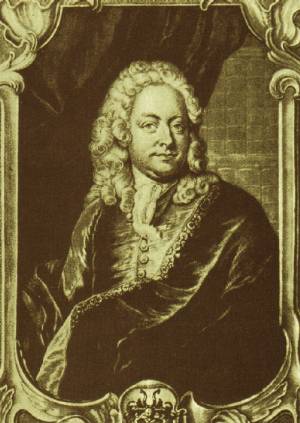<Back to Index>
- Mathematician Kurt Otto Friedrichs, 1901
- Composer Johann Mattheson, 1681
- King of Portugal and the Algarves Carlos I o Diplomata, 1863
PAGE SPONSOR

Johann Mattheson (28 September 1681 – 17 April 1764) was a German composer, writer, lexicographer, diplomat and music theorist.
Mattheson was born and died in Hamburg. He was a close friend of George Frideric Handel, although he nearly killed him in a sudden quarrel, during a performance of Mattheson's opera Cleopatra in 1704. Handel was saved only by a large button which turned aside Mattheson's sword. The two were afterwards reconciled.
The son of a well to do tax collector, Mattheson received a broad liberal education and, aside from general musical training, took lessons in keyboard instruments, violin, composition and singing. By age nine he was singing and playing organ in church and was a member of the chorus of the Hamburg opera. He made his solo debut with the Hamburg opera in 1696 in female roles and, after his voice changed, sang tenor at the opera, conducted rehearsals and composed operas himself. He was cantor at St. Mary's Cathedral from 1718 until increasing deafness led to his retirement from that post in 1728.
Mattheson's chief occupation from 1706 was as a professional diplomat. He had studied English in school and spoke it fluently. He became tutor to the son of the English ambassador Sir John Wich and then secretary to the ambassador. He went on diplomatic missions abroad representing the ambassador. In 1709 he married an English woman.
After his death in 1764, Johann Mattheson was buried in the vault of Hamburg's St. Michaelis' Church where his grave can be visited to this day.
Mattheson is mainly famous as a music theorist. He was the most thorough writer on performance practice, theatrical style, and harmony of the German Baroque. In addition to some original work — particularly on the relationship of the disciplines of rhetoric and music — he was a compiler of most of the ideas current at the time.
The bulk of his compositional output was vocal, including eight operas, and numerous oratorios and cantatas. He also wrote a few sonatas and some keyboard music, including pieces meant for keyboard instruction. All of his music, except for one opera, one oratorio, and a few collections of instrumental music, went missing with the spoils of war after World War II, but was given back to Hamburg by Yerevan (Armenia) in 1998. This includes four Operas and most of the oratorios. The manuscripts are now located at the Staats and Universitäts bibliothek Hamburg, former Hamburg Stadtbibliothek.